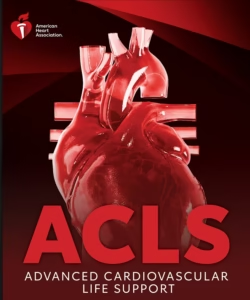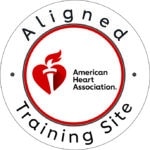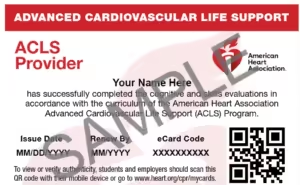


About the Course
This is the part 2 skills testing for the blended learning ACLS Course. You will come in person to complete:
Review of ACLS Concepts
Adult CPR Testing
Megacode (Patient Simulation)
You must complete/Purchase-
Part 1 (Online Portion) Sold Separately and can be obtained at:
https://shopcpr.heart.org/heartcode-acls
Pre Course Self Assessment is also required:
AHA (American Heart Association) E-Card issued same day as the course. Certification card is good for 2 years.
- Apply the BLS, Primary, and SecondaryAssessments sequence for a systematic evaluation of adult patients
- Perform prompt, high-quality BLS, including prioritizing early chest compressions and integrating early automated external defibrillator (AED) use
- Recognize and perform early management of respiratory arrest
- Discuss early recognition and management of ACS and stroke, including appropriate disposition
- Recognize and perform early management of bradyarrhythmias and tachyarrhythmias that may result in cardiac arrest or complicate resuscitation outcome
- Recognize and perform early management of cardiac arrest until termination of resuscitation or transfer of care, including immediate post–cardiac arrest care
- Model effective communication as a member or leader of a high-performance team
- Evaluate resuscitative efforts during a cardiac arrest through continuous assessment of CPR quality, monitoring the patient’s physiologic response, and delivering real-time feedback to the team
- Recognize the impact of team dynamics on overall team performance
- Discuss how the use of a rapid response team or medical emergency team may improve patient outcomes
- Define systems of care
Medical Training Programs and schools, Medical Residency, Healthcare provider employment, Such as Nurinsg, EMT/Paramedic, Physicians, Dental Providers, and many more.
The American Heart Association strongly promotes knowledge and proficiency in all AHA courses and has developed instructional materials for this purpose. Use of these materials in an educational course does not represent course sponsorship by the AHA. Any fees charged for such a course, except for a portion of fees needed for AHA course materials, do not represent income to the AHA.